
Come winter and Indian households start stocking up on various kinds of jaggery. From the pale coloured cane jaggery that is more common in the northern and western regions of India to the fragrant date palm jaggery of eastern India, this is the time to revel in its sweet goodness.
Jaggery that contains 50% sucrose, 20% invert sugars, 20% moisture has some amount of nutrients like iron, potassium, magnesium, B-vitamins and fibre. While scientists are still debating about whether the proportion of nutrients of jaggery is enough to have any real benefits, Ayurveda and alternative medicine have, for centuries, advocated the benefits of jaggery and its use for various medicinal purposes.
As a result, most Indian households staunchly believe in the health benefits of jaggery. Well, who are we to debate against ancient wisdom, especially when it’s about something as delicious as jaggery.
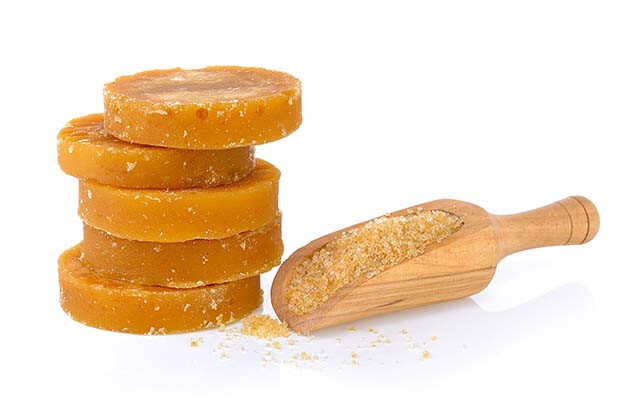
Preparation Of Jaggery
Jaggery is made from the juice of sugarcane or the sap of some trees like the date palm, toddy palm and Kithul. The extracted juice is heated and reduced to a third of the original quantity. The liquid is continuously stirred, and once it has thickened enough, it is transferred to a shallow pan and allowed to cool and solidify into jaggery. This jaggery is then cut into blocks or moulded into roundels or bricks.
In India, Maharashtra produces the largest amount of jaggery, with Kolhapur being the hub of production. The city also has a GI Tag (geographical indication) for jaggery. Uttar Pradesh’s Muzaffarnagar district boasts the biggest jaggery wholesale market in the world.

Benefits Of Jaggery In Traditional Dishes
Jaggery is used as a healthier substitute for sugar. Besides the health benefits of jaggery, gur, as it is called in Hindi, is also prized for its taste and is used in several sweet and savoury dishes. Jaggery is an intrinsic part of certain Hindu festivals like Makar Sankranti and Pongal where people eat a lot of sweet dishes made with jaggery. Some of these special regional dishes with jaggery include tilgul, gajak, tal na laddoo, tal sankali, gur ke chawal, laddoos, puran poli, chakkara pongali, milk pongal, ariselu, panakam, gurer payesh, nolen gurer sandesh, pitha, naru, patishapta and more.
Tip: Date palm jaggery, called patali gur, has a wonderful fragrance and is available in the winter months in Bengal.
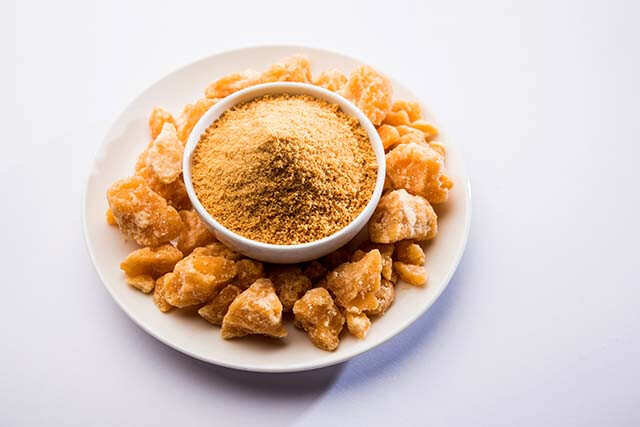
Benefits Of Jaggery For Digestion
Traditionally, jaggery is eaten to aid digestion. A small piece of jaggery is eaten after dinner to curb post-meal sweet cravings. It also activates the digestive juices and increases secretion of digestive enzymes that break down the food that you have eaten. Eating jaggery regularly also helps ease bowel movements and prevents constipation related problems. The magnesium in jaggery soothes your digestive system and keeps it running in top form. Did you know that 10 grams of jaggery gives you 16mg of magnesium?
Tip: Diabetics should have jaggery in moderation as it can quickly raise your blood sugar levels.
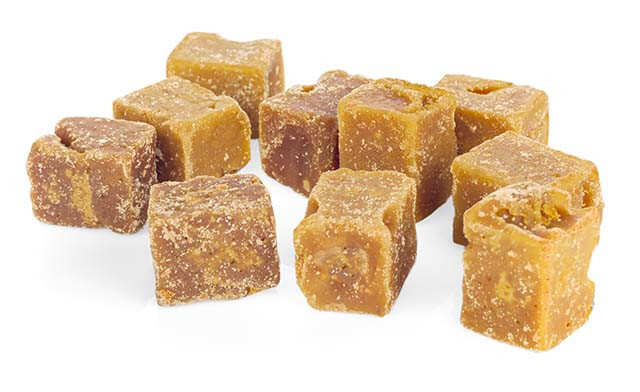
Benefits Of Jaggery In Menstruation Issues
The iron and folate in jaggery ups your haemoglobin levels and thereby reduce the risk of anaemia, a condition that is the bane of many an Indian woman. Hence, jaggery is often offered to pregnant women and those who are menstruating. Besides providing the body with much-needed iron during your periods, it also helps relieve cramps and bloating. Incidentally, jaggery contains 11 mg of iron per 100 gram. Eating some jaggery every day will reduce PMS symptoms. Compounds in jaggery help relax you and give you relief from fluctuating hormone levels.
Tip: If you are suffering from iron deficiency, do not depend just on jaggery. Eat plenty of other iron-rich foods and perhaps take a supplement as well.
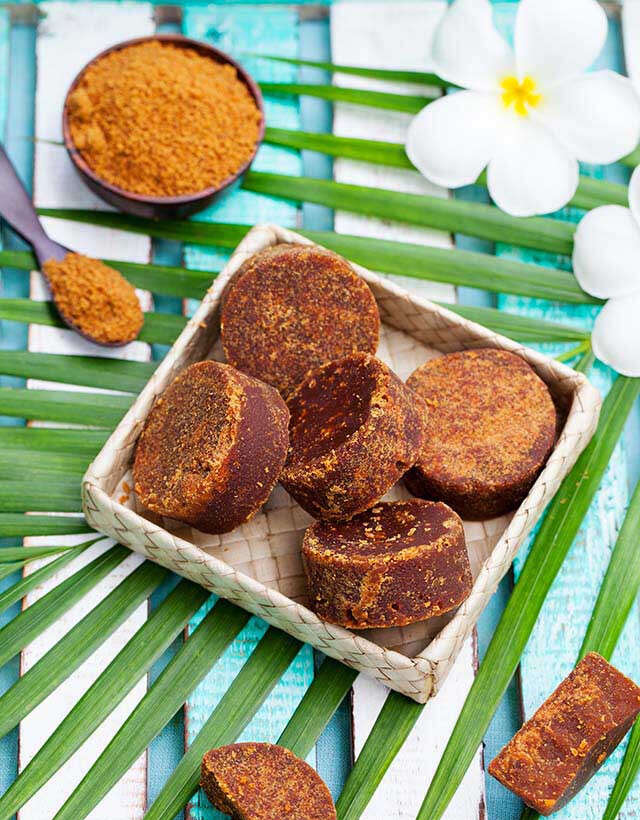
Benefits Of Jaggery For Immunity
Ancient wisdom has always advocated that jaggery should be consumed regularly, especially in the winter months, to up one’s immunity against frequent infections. The many nutrients in jaggery, especially zinc and selenium, protect you from recurrent infections and oxidative stress that causes a lot of damage to our bodies.
Tip: Selenium in jaggery is a potent antioxidant that protects your body from the effects of free radicals.
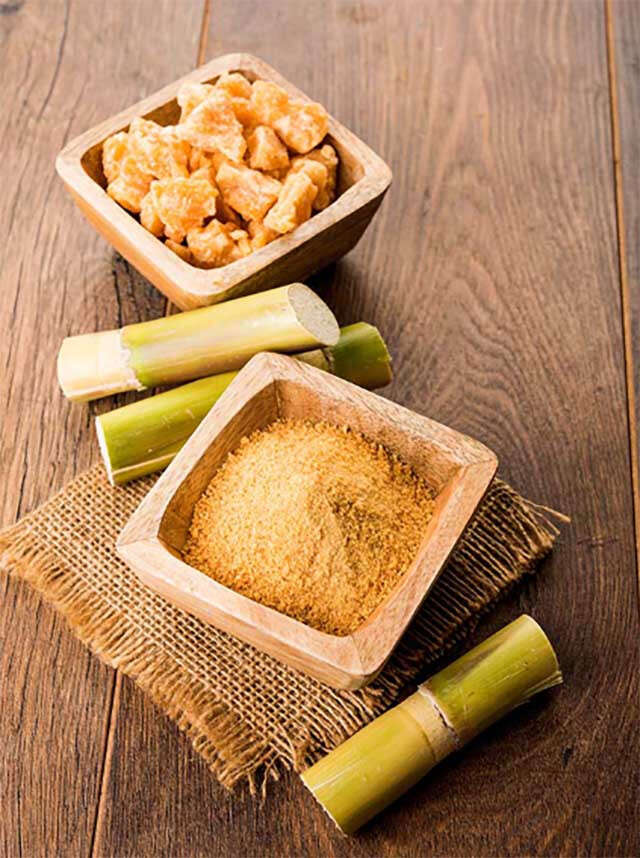
Benefits Of Jaggery For Weight Loss
Can sweet jaggery help you in your weight loss journey? Well, that is what traditional medicine suggests. Benefits of jaggery for weight loss happens due to several reasons. For one, jaggery can raise your metabolism. This is because it is rich in the mineral potassium, which helps to maintain the electrolyte balance, build muscles and boost your metabolism. Jaggery is also useful in beating water retention and bloating, mainly due to the presence of potassium in it.
Tip: Have you hit a weight loss plateau? Start eating a little bit of jaggery every day to boost your metabolism.

Benefits Of Jaggery For Cough And Cold
There is a reason why jaggery is consumed in such significant amounts during winter months. It is to protect you against the respiratory illnesses that plague us during this time. Jaggery is effective against the onset of asthma, bronchitis, cough and colds. Traditionally jaggery is combined with sesame seeds, both black and white, in the form of gajak, til and gur laddoos or til pattis, to get maximum benefits. Chewing some jaggery also protects you from throat infection and lung problems. Suck on a piece of jaggery to soothe your throat.
Tip: According to Ayurveda, jaggery warms the lungs and staves off infections. Carbohydrate-rich jaggery raises body temperature slightly as it gets digested.
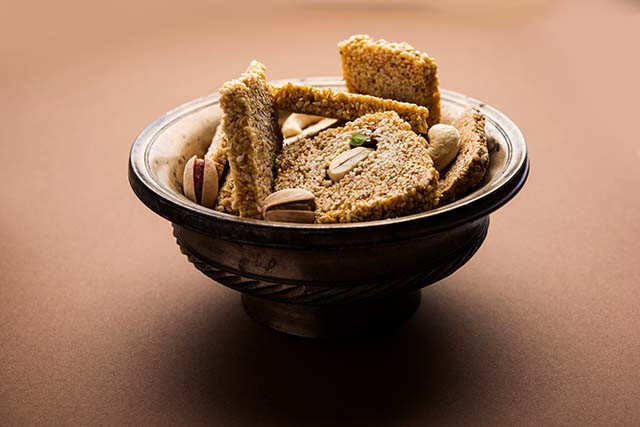
Benefits Of Jaggery For Better Health
Besides, being beneficial for the host of problems mentioned above, eating jaggery can help you lead a healthier life by controlling your blood pressure. The potassium and sodium in jaggery help regulate one’s blood pressure. This wonder food also keeps our central nervous system in good condition.
Jaggery aids the liver by helping in detoxing the body and acts as a natural diuretic as well. It soothes bladder inflammation and is helpful in other urinary problems. What’s more, if you suffer from joint pains and arthritic symptoms, eating some jaggery can help alleviate that too! Ayurveda recommends eating jaggery with ginger or with a little milk for pain relief. An instant energy booster, jaggery also has the unique ability to be able to cure hiccups! Yes, having some jaggery with dry ginger powder and a glass of warm water can stop you from going hic hic hic all day!
Tip: Eat jaggery judiciously because 100 grams of jaggery contains a whopping 385 calories and overdosing will lead to weight gain!

Benefits Of Jaggery FAQs
Q. Why do people eat jaggery in winter?
A. Jaggery is rich in carbs and keeps the body warm. It also staves off coughs and colds and other respiratory illnesses that are common during winter.
Q. Is jaggery fattening?
A. Jaggery is very high in calories and should be taken in moderation. A small piece every day is what you should stick to for nutrition benefits without the risk of weight gain.

Q. Why is jaggery eaten after food?
A. Jaggery controls post-food sugar cravings, and it also aids in digestion. Hence it is also sometimes mixed with digestives like fennel seeds.


